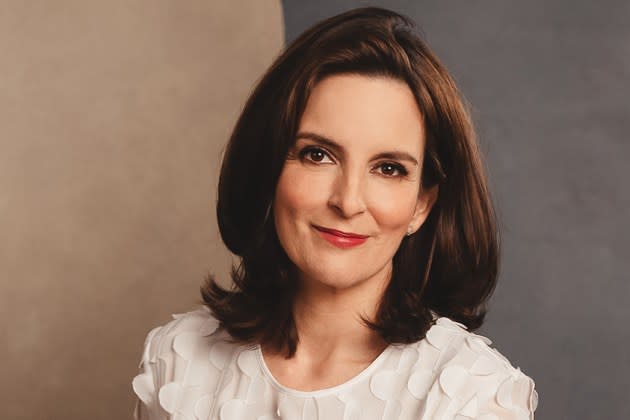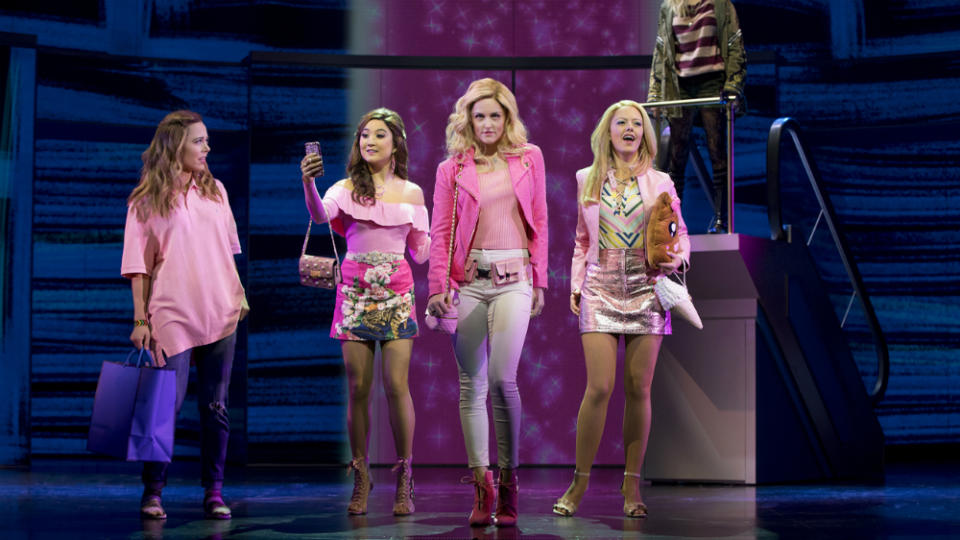Tina Fey on Her ‘No A–holes’ Policy and Bringing ‘Mean Girls’ Back to the Big Screen
- Oops!Something went wrong.Please try again later.
- Oops!Something went wrong.Please try again later.
- Oops!Something went wrong.Please try again later.
- Oops!Something went wrong.Please try again later.

When the coronavirus hit last spring, some people embraced lockdown as an opportunity to get around to doing the things they always said they’d do someday. The months-long hiatus from normal life meant there was finally time to crack the spine on that moldering copy of “War and Peace,” binge-watch the must-see TV show that had gone unseen or perhaps embrace the art of banana bread-making.
Not Tina Fey.
More from Variety
She spent extra time with her husband, the composer Jeff Richmond, and their two daughters. But her workload never wavered. In the past 14 months, she’s been a pandemic-era jack-of-all-trades. Want a taste of Hollywood’s new normal? Fey helped write the handbook.
While production was entirely shut down in 2020, she put finishing touches from home on “Mr. Mayor,” the NBC sitcom starring Ted Danson and Holly Hunter, and remotely filmed a “30 Rock” reunion special entirely over Zoom that aired in July.
As the pandemic wore on and the entertainment industry got more innovative, Fey oversaw the creation of an entire season of television for the upcoming Peacock comedy “Girls5eva” by convening a virtual writers’ room.
In between, she co-hosted the Golden Globes with Amy Poehler from opposite coasts, emceed a tribute to Broadway and saw the Disney Plus release of Pixar’s “Soul,” in which she voices the sassy cynic called 22.
Congrats on the Oscar win for best animated feature for “Soul.” Did you watch the ceremony?
I watched until “Soul” won. I was very excited for those guys.
What do you think of the part of the ceremony that you did watch?
It was nice to see people out and see a red carpet. I have a problem; when awards shows actually start, if you’re home, you just clean your kitchen. I only half listened. But I did think people looked good.
You’re calling from the writer’s room for “Mr. Mayor.” Have you adapted to working during the pandemic?
This is the first time, for me, we’re starting a season virtually. I feel like we’re all used to it. One thing that’s nice is I can work with people on the west coast more easily. It used to be that we asked people to pick up and move to write for a TV show, which now seems insane.
What’s the latest on turning the “Mean Girls” musical into a movie?
We’re still relatively early on. We’re looking for a director right now. The first time we had new actors play these roles [on Broadway], it was like breaking the seal, like, “Now these roles belong to more than one set of actors.” I’m excited to see who ends up being in the movie.

Would you have the Broadway actors reprise their parts?
I think our Broadway actors are probably too [laughs] old. It’s been four years since they did it on Broadway.
Would you ever direct?
I’ve thought about it, but I really respect directors who think in pictures. The great thing about TV is that a showrunner can do hands-on stuff with the actors without having to think about the coverage or camera shots. I’ve always left it to people who it’s truly their calling. I never wanted to be a director that was there just to make sure people don’t paraphrase the script.
Are you a natural leader?
Once I became a head writer at “SNL,” that was the beginning. You’re taking other people’s sketches, and you don’t take them away and manhandle them. You try to sit there with them to figure out, “How can we help you make the best version of what you were hoping to do?” Then the trial by fire of “30 Rock.” I learned so much in those seven years about production, handling people, respecting your crew’s time, collaborating with designers and even when to bother a guest star to come in.
Amy Poehler and Robert Carlock are among your frequent collaborators. What’s the secret to long-term working relationships?
It’s the No A-hole policy. For a start, no one should be throwing a baked potato at anyone. That’s the baseline. With someone like Amy Poehler, we have a shorthand with each other. With someone like Robert Carlock, we can trust each other to finish it. It’s a great foundation to build on. And then Jeff Richmond, we’re married. He can’t escape me.
You’ve said women in writers’ rooms were once regarded like cappuccino machines: We have one, so why do we need another? Has that changed?
In some ways, yes. Any project I’m a part of, I’m trying to very proactively shape these rooms to be as diverse as possible. That cappuccino machine thinking — now, people have to [stop] thinking that way about other marginalized groups. Whether it’s having a Native American writer, a nonbinary writer, you just can’t be, like, “Oh, there’s one.” Or “We have one gay person on our staff. We’ll ask them every question about what a gay character might do.”
How does your approach to comedy change with the times?
Everyone’s figuring out what the new rules of comedy are. They definitely have changed for the better. Trope and joke structures that were based around othering people or minimizing people, good comedy writers are challenging themselves to walk away from that. Here’s an example of a piece I thought was hilarious, and I cannot imagine it having survived at “SNL” when I first worked there. Bowen Yang playing the iceberg from “Titanic” on “Weekend Update.” If they tried to get that piece on in 1997, it wouldn’t have. And nobody would have thought they were boxing them out, but the monolithic heteronormative room — to use some terms — wouldn’t have gotten it, wouldn’t have liked it, and I feel really confident that it wouldn’t have gotten on. That’s an ideal where I see a new style of comedy that’s truly funny and working in a new way.
Do you think about the potential legacy of your work when you take on new projects?
I don’t know if I’m aware of the legacy, but I’m wearing, like, first do no harm in the moment.
Can you elaborate?
When we look at our jokes now, we’re looking for “Is this joke going to be perceived as homophobic? Or disrespectful to homeless people?” Every joke does go through a vetting process, at least on our shows, now. “Does it feel fair?” I don’t think we’re thinking, “What will our legacy be,” so much as “Is this a fair hit?” Is it looking at it from other people’s point of view besides our own?
Do you still watch “SNL”?
I watch it with my older daughter, so I’ve gone back to staying up.
What is it like to share that with her?
It’s great. She has a very good comedy education, so she’s a discerning viewer. And it’s also funny because there will be things where she’s like, “No, what?” I don’t want to get them in trouble, but John Krasinski kissing Pete Davidson as a blow to the monologue — she’s like, “Why? How’s that a joke?” She is Gen Z, and she’s more advanced than all of us. Then I try to give her what I imagine the backstory is where I’m like, “I bet maybe they had a different ending for the monologue at dress, and then someone at like 11:20 [p.m.] was like, ‘Will this work?’” In that case, she was still like, “No.”
Have you introduced your daughters to any of your other work?
My 9-year-old was probably 5 or 6, and at the time she just took “Mean Girls” at face value: “The Plastics are beautiful. They’re the heroes.” I was like, “OK, well, there’s some nuance you’re missing here, but we’ll get to it.”
I was roughly the same age when I first saw “Mean Girls.” I remember asking my mom what a slut was after watching the movie.
Please tell your mom I’m sorry.
Best of Variety
'House of the Dragon': Every Character and What You Need to Know About the 'Game of Thrones' Prequel
25 Groundbreaking Female Directors: From Alice Guy to Chloé Zhao
Sign up for Variety’s Newsletter. For the latest news, follow us on Facebook, Twitter, and Instagram.

